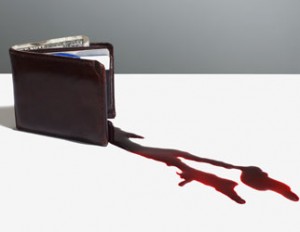3 ways to kill your savings plan
These savings killers are all to common, yet easily avoided with a little effort. Are they lurking in your financial life?
Advertisement
These savings killers are all to common, yet easily avoided with a little effort. Are they lurking in your financial life?

People are always wishing they could save, or save more.
Despite nifty strategies like pay-yourself-first plans and rounding-up debit transactions, our savings often languish. If you want to keep your savings where they need to stay to grow – as opposed to watching them dribble away – make sure you’re not making these three mistakes:
1. Failing to plan for inevitable expenses
If you have a furry friend and you don’t have pet care in your budget, you’ll dip into your savings to cover things you should be planning for like vet bills. Sure, you don’t want to think about your Snookums getting sick, but without a plan for pet care, you’ll be forced to tap what should be untouchable money simply to stay even. Ditto things like school supplies, camp fees and sports costs for the kids.
Just as you would for insurance, taxes and gifts, estimate an amount you’re likely to spend in a year add 10% and then divide your total by 12. That’ll give you the amount you need to allocate in your budget each month. Move the money to a savings account automatically, and then move it back to your chequing account when you have to use it.
2. Not having an emergency fund
Needing new tires is not an emergency; you had to know you’d need new tires eventually, so that’s an inevitable expense. An emergency is a loss of income due to something like illness, layoff, or death in the family. Stash the equivalent of six months’ worth of essential expenses for an emergency. Without an emergency fund, you’ll blow through your savings; you may even have to liquidate investments at a most inopportune time.
3. Living above your means
If you’re saving $200 a month, and racking up $250 in consumer debt (credit card balances not paid off in full, line of credit balances that keep creeping up) you’re playing a shell game with yourself, but you’re not saving. To save, you have to take money out of your cash flow – read: don’t spend it on anything – and put it to work for the future.
If you’re serious about saving, you’ll build a plan that takes these killers into account so you don’t just end up spinning your wheels.
Share this article Share on Facebook Share on Twitter Share on Linkedin Share on Reddit Share on Email